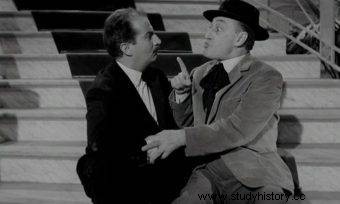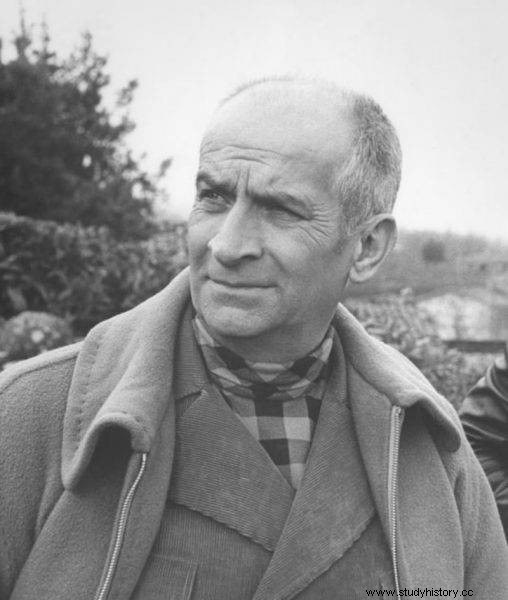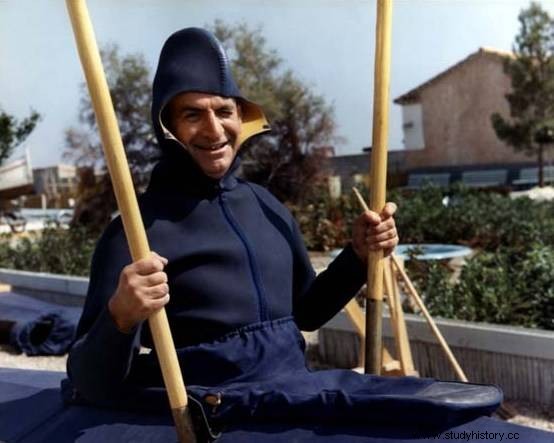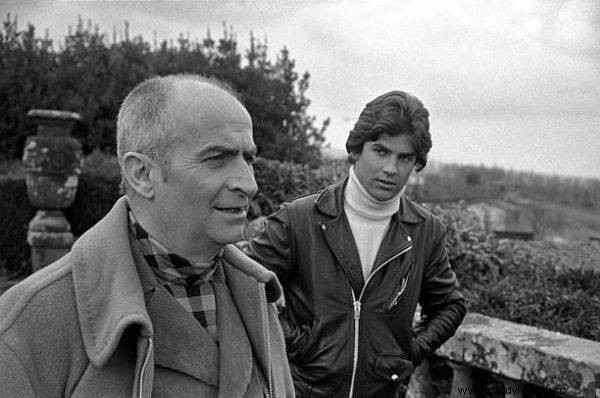A life full of sacrifices, a career in his 50s and the status of a legend. Madness or the realization of dreams? How did the life and career of a man known for his role as a funny gendarme go on?
In the 1960s, the whole world heard about a comedian from France. The Times weekly in one of the reviews even called him "the French Chaplin". Louis de Funès, because we are talking about him, can be considered a model for all future actors dreaming of a debut on the big stage.

Louis de Funès and Totò in a scene from the movie Toto in Madrid
He himself has devoted his entire life to acting, and his career only gained momentum when the actor was in his fifties. It was then that he played the lead role in the movie "The Gendarme of Saint Tropez". He previously appeared in front of the camera in The Temptation of Barbizon, but it was only an episode as the scene with de Funès lasted only 32 seconds . Anyway, it was a breakthrough in his career and opened the way to fame for him.
All on one card
Louis de Funès was born on July 31, 1914. He was the youngest of the siblings raised by a single mother. The family's financial situation was not the best. "Fufu" - because that was what little Louis was called at home - quit his education and went to various jobs to earn his bread . He even tried to join the army, but was rejected because of his height (164 cm) and weight (55 kg).
During this time, he married the former tennis champion Germaine Carroyer, with whom he had a son - Daniel. He wasn't a good father. He was not interested in raising a child and was rarely at home. In 1939 he was remembered by the French army, but he was quickly transferred to the reserve, which allowed him to polish his talent by playing and performing in pubs and clubs.

Alongside his new love, de Funès put everything on one card - he decided to make his biggest dream come true.
At that time, he completely neglected his family and focused on his dreams of acting. In 1943, he met his second wife, Jeanne Augustine Barthélemy, with whom he later had two sons - Patrick and Olivier. He decided to divorce Germaine and cut off his relationship with Daniel. Years later, the latter confessed:“I couldn't call him dad. I called him Louis. ”
Alongside the new love, de Funès put everything on one card - he decided to make his biggest dream come true. He quit playing in pubs and making a living from part-time jobs. He enrolled in an acting school. There he perfected his workshop and met many influential people from the industry.
In 1946, he starred in the movie "The Temptation of Barbizon," which opened the door to his career. He began receiving offers for comedy roles in the theater; the critics judged him very well and the audience simply loved . In 1956, Louis was given another role in the movie "Black Market in Paris". Everyone in France talked about him. He started to be recognized, he appeared on the screen regularly.
It is worth mentioning that he was in his forties at the time. This, of course, discouraged many directors who often offered him supporting roles. It might seem that in such a situation one can only dream of international fame…
The gendarme who delighted the world
In the 1960s, in his late fifties, with most actors his age already having a rich career behind them, Louis de Funès was just getting started. He was going against the tide and not everyone liked it. The more that the roles he played were specific.
This fact was decided by screenwriter Richard Balducci, who came up with the idea of making a film about an unusual gendarme. He drew inspiration from his own experiences, because his camera was stolen once and the police were not particularly eager to take action on this . There was only one man for this role - de Funès.

Louis de Funès on the set of the comedy movie "Little Swimmer"
His style of playing quickly turned out to be a recipe for success - and not just any, because international! The first great film was "The Gendarme in Saint Tropez", which drew crowds of people to the cinemas. At the same time, another production with the actor's participation was released. The cult "Fantomas" was shot.
The cinemas were bursting at the seams, and the actor, who was on everyone's lips, was no longer offered supporting roles. Two years later, in 1966, Louis de Funès starred in "The Great Vagabond". He was nominated for an Oscar for this role, and the film itself was watched by almost 18 million viewers. Previously, no actor or director in France could boast of such achievements. This record was broken only in 1998 when "Titanic" was released.
The world became interested in French comedy by de Funès. His original style was commented on. He played a nervous, choleric gendarme who ineptly tries to fight crime. It became his showpiece and went down in history. He himself mentioned that he took the idea for such a creation from ... his mother, who was an extremely nervous person.
Until death do us part
Louis de Funès was a titan of work. He did not want to stop - despite many hours on the set - because of weakness or due to his increasingly advanced age. The organism, however, was heading in a different direction and in the mid-1970s the actor had a heart attack. He then changed his diet and quit smoking. He wasn't going to quit acting, though.
He continued to accept suggestions for new films that were still eagerly watched. Nevertheless, more and more producers resigned from the services of the eminent actor for fear of his health. Is it right? The answer came in 1980, when the actor suffered a second heart attack. It would seem that this is the end, it's time to retire. However, none of these things. Louis de Funès wanted to pursue his career.

De Funès with her son Olivier
Not everyone approached it with approval, especially since the comedian was not particularly liked by the community - perhaps because of his character. He did not attend parties or banquets. He did not try to make new friends. After work, he grew roses in the garden or went fishing. Flowers were his second, great passion. The actor even bred his own orange petal rose variety called "de Funès".
In 1982, another part of the adventures of the gendarme Cruchot was released in cinemas. And although some critics already indicated that this topic was overloaded, and the actor himself was accused of playing "one hoof" , the movie enjoyed a lot of attendance. Sam de Funès, who did not particularly cope with criticism, had to reconcile passion with a frugal lifestyle. At the end of the year, he and his family went on a well-deserved vacation. However, they were not successful, because the comedian caught a cold and decided to return home. He wanted to heal himself quickly because he was already planning his next productions, but unexpectedly suffered a third heart attack and died.
Films with de Funès are still popular today and are occasionally shown on television as cinema classics. You can still meet many lovers of the actor who are fans of his style, and skeptics of his technique who maintain that he was an actor in one role. On the other hand, they agree that he is considered a model for young actors on their way to success.
